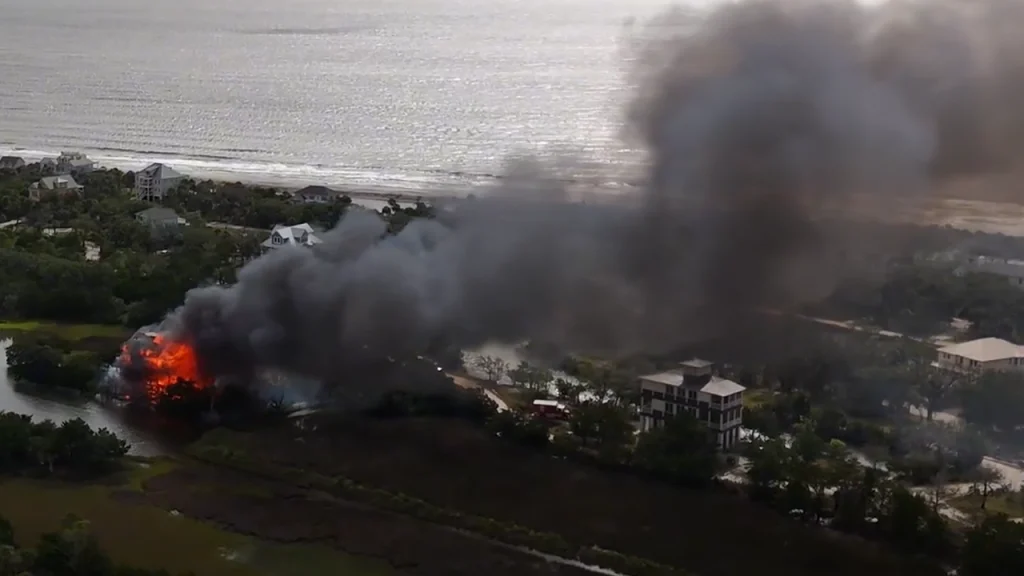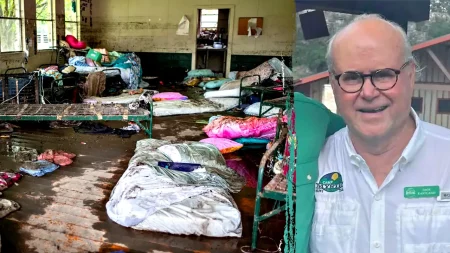A Judge’s Home in Flames: The Mysterious Fire at the Goodsteins’ Waterfront Residence
In a shocking incident that initially sparked political speculation, a fire ravaged the million-dollar waterfront home of South Carolina Judge Diane Schafer Goodstein and her husband, Vietnam War hero and former state lawmaker Arnold Goodstein. The blaze, which occurred on Saturday at their Edisto Beach property, left Arnold with broken legs after he jumped from a window to escape the flames. Their son and grandson were also injured in the incident. Despite early reports suggesting arson or an explosion, the South Carolina State Law Enforcement Division (SLED) has now stepped back from these theories, stating, “At this time, there is no evidence to indicate the fire was intentionally set.” SLED Chief Mark Keel further clarified that preliminary findings show no evidence of a pre-fire explosion, though the investigation into the exact cause continues.
The timing of the fire raised immediate questions due to Judge Goodstein’s recent ruling against the Trump administration in a voter registration case—a decision later overturned by a higher court. This connection prompted New York Democratic Representative Daniel Goldman to make inflammatory statements on social media, suggesting “MAGA-world” and White House officials might bear responsibility for the blaze. Goldman wrote, “Today, someone committed arson on the Judge’s home, severely injuring her husband and son. Will Trump speak out against the extreme right that did this?” Such accusations were quickly labeled as “demented smears” and “libelous madness” by White House advisor Stephen Miller, and SLED’s preliminary findings have undercut Goldman’s assertions about intentional arson. This exchange highlights the increasingly volatile political climate where tragedies can become fodder for partisan accusations before facts are established.
The dramatic rescue effort involved firefighters using kayaks to reach the isolated property, with at least one victim requiring airlift to a hospital. Arnold Goodstein reportedly suffered broken legs after jumping from a window, while Judge Goodstein was fortunately away from home walking her dogs when the fire erupted. Details about the injuries sustained by their son and grandson remain limited, though they were serious enough to require hospitalization. Adding to the tragedy, according to Representative Nancy Mace (R-S.C.), the family’s pets perished in the fire. The isolation of the property presented unique challenges for first responders, who had to improvise water-based approaches to reach victims trapped by the rapidly spreading flames.
With arson and explosion theories now considered unlikely, investigators are focusing on more common causes of residential fires. According to the U.S. Fire Administration, most house fires result from cooking mishaps, electrical problems, heating equipment malfunctions, or unintentional careless behavior. The investigation will likely include thorough examination of what remains of the structure, searching for the fire’s point of origin and any materials that might indicate its cause. This process may include forensic testing of recovered materials and analysis of witness statements or video footage captured by bystanders from nearby water or air. Such comprehensive investigations can take months to complete, particularly in cases with extensive structural damage.
The Goodsteins are prominent figures in South Carolina’s legal and political landscape. Diane Goodstein, 69, serves as a longtime judge, while Arnold Goodstein, 81, is not only a former state lawmaker but also a Vietnam War hero. Their standing in the community made the incident particularly newsworthy, but it also meant that speculation about possible motivations spread rapidly before investigators had time to assess the scene properly. Chief Keel specifically urged “citizens, elected officials and members of the press to exercise good judgment and not share information that has not been verified,” highlighting the dangers of premature conclusions in high-profile cases. This caution seems particularly relevant given the political accusations that emerged within hours of the fire.
As the investigation continues, several questions remain unanswered beyond the fire’s cause. Authorities have not addressed whether the Goodsteins had received any threats prior to the incident, which would be a standard avenue of inquiry in any case involving public officials. The full extent of the victims’ injuries and their recovery progress remains unclear, beyond the reported broken legs suffered by Arnold Goodstein. What is evident is that the family has experienced a devastating loss—their home completely destroyed, possessions lost, family members injured, and beloved pets killed. Regardless of what caused the fire, the Goodstein family now faces a long road to recovery, both physically and emotionally, as they come to terms with this traumatic event that transformed their lives in a matter of hours on what began as an ordinary Saturday at their Edisto Beach home.







